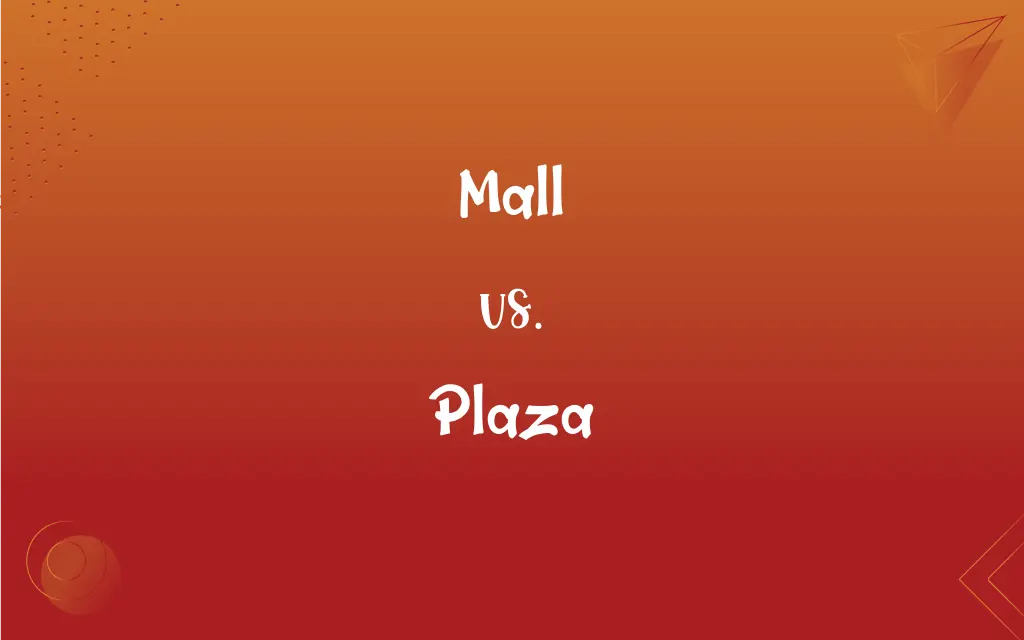Mall vs. Plaza: What's the Difference?
Edited by Janet White || By Harlon Moss || Published on July 31, 2024
A mall is a large indoor shopping center, while a plaza is an open public space, often used for markets and social gatherings.

Key Differences
Malls are typically large, enclosed spaces with a variety of stores and services under one roof, often characterized by a controlled environment. They are designed for shopping efficiency and are usually privately owned. Plazas, conversely, are open-air public spaces, often in the heart of a city or town, surrounded by buildings and used for community activities, markets, and social gatherings.
The architectural design of a mall focuses on internal space, corridors, and often features a centralized layout to facilitate easy movement between stores. Malls often have food courts and entertainment facilities. A plaza, however, is an open, external space that may include fountains, art installations, or seating areas, serving as a communal gathering spot rather than a shopping destination.
Malls are primarily commercial spaces that cater to a wide range of shopping and entertainment needs, often including large department stores as anchor tenants. In contrast, plazas may host temporary vendors or events but generally do not have permanent retail establishments. They are more associated with cultural, civic, or leisure activities.
The environment in a mall is controlled, with air conditioning and heating, providing comfort for shoppers year-round. Malls are designed to encourage prolonged visits and consumer spending. Plazas, on the other hand, are subject to weather conditions and are more about experiencing the outdoors, used for events like concerts, festivals, or public rallies.
Malls are often located in suburban areas and cater to those who travel by car, offering extensive parking facilities, while plazas are typically situated in urban centers and are accessible by public transportation, walking, or cycling. Plazas often hold historical significance and are a focal point of city life.
ADVERTISEMENT
Comparison Chart
Primary Function
Shopping center
Public gathering space
Location
Usually suburban
Often urban
Design
Enclosed, indoor
Open-air, outdoor
Purpose
Commercial activities
Cultural, civic events
Environment
Climate-controlled
Subject to outdoor conditions
ADVERTISEMENT
Mall and Plaza Definitions
Mall
A mall is a commercial establishment housing multiple retailers.
The new mall features a cinema and several restaurants.
Plaza
A plaza is an open public square in a city.
The plaza was decorated for the annual art festival.
Mall
A mall is an enclosed area for shopping and entertainment activities.
The mall was crowded during the holiday season.
Plaza
A plaza is an open-air meeting place for social and cultural events.
The New Year's Eve celebration at the plaza was spectacular.
Mall
A mall is a large indoor shopping complex.
She spent her Saturday afternoon browsing the stores in the mall.
Plaza
A plaza is an urban open area surrounded by buildings.
They enjoyed their lunch at a café overlooking the plaza.
Mall
A mall is a modern, indoor marketplace.
The mall has become a popular meeting spot for teenagers.
Plaza
A plaza is a communal outdoor space for gatherings.
The concert at the plaza attracted a large crowd.
Mall
A mall is a building with a variety of shops and services.
They went to the mall to buy new shoes and clothes.
Plaza
A plaza is a public pedestrian space in a town or city.
The city's main plaza is a popular tourist attraction.
Mall
A large, often enclosed shopping complex containing various stores, businesses, and restaurants usually accessible by common passageways.
Plaza
A public square or similar open area in a town or city.
Mall
A street lined with shops and closed to vehicles.
FAQs
What is a mall?
A mall is a large, enclosed shopping center with multiple retail stores and services.
Can plazas have shops?
Plazas may have temporary vendors or surrounding shops, but they are not primarily shopping destinations.
Is a mall private property?
Yes, malls are usually privately owned and managed properties.
Do plazas have historical significance?
Many plazas hold historical and cultural significance in their cities.
Can plazas be used for protests or rallies?
Yes, plazas are common venues for public rallies, protests, and civic activities.
Are malls always indoors?
Yes, malls are typically enclosed and indoor.
Are malls found in city centers?
Malls are typically found in suburban areas, though some are in urban settings.
What is a plaza?
A plaza is an open public space, often in a city center, used for gatherings and events.
Are plazas used for events?
Yes, plazas are often used for public events, markets, and gatherings.
What activities occur in plazas?
Activities in plazas include cultural events, concerts, markets, and social gatherings.
How do plazas benefit a city?
Plazas provide open spaces for community interaction, events, and enhance the city's aesthetic appeal.
Is parking available at malls?
Malls usually provide extensive parking facilities.
Are malls climate-controlled?
Yes, malls are enclosed and have climate control for year-round comfort.
Are plazas pedestrian-friendly?
Plazas are designed to be pedestrian-friendly and are often located in walkable areas of cities.
Do malls have food options?
Most malls have a variety of food options, including food courts and restaurants.
Is a plaza considered a public space?
Yes, plazas are public spaces, often owned and maintained by the city or community.
Do malls contribute to the local economy?
Yes, malls contribute significantly to the local economy through retail sales and employment.
Can plazas be found in small towns?
Yes, plazas are common in both large cities and small towns.
Do malls have entertainment facilities?
Yes, many malls include cinemas, arcades, and other entertainment options.
Do malls usually have anchor stores?
Yes, malls often have large anchor stores that draw in shoppers.
About Author
Written by
Harlon MossHarlon is a seasoned quality moderator and accomplished content writer for Difference Wiki. An alumnus of the prestigious University of California, he earned his degree in Computer Science. Leveraging his academic background, Harlon brings a meticulous and informed perspective to his work, ensuring content accuracy and excellence.
Edited by
Janet WhiteJanet White has been an esteemed writer and blogger for Difference Wiki. Holding a Master's degree in Science and Medical Journalism from the prestigious Boston University, she has consistently demonstrated her expertise and passion for her field. When she's not immersed in her work, Janet relishes her time exercising, delving into a good book, and cherishing moments with friends and family.






































































